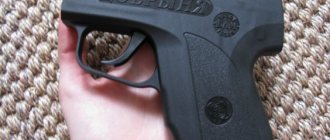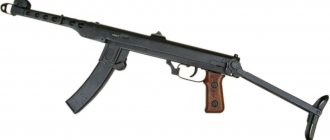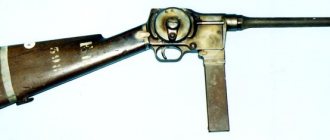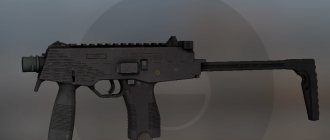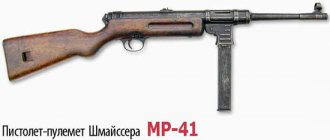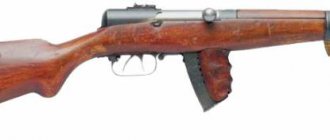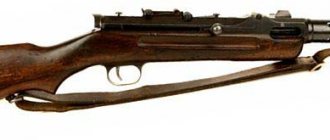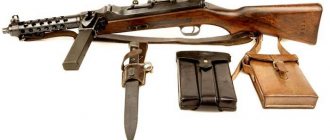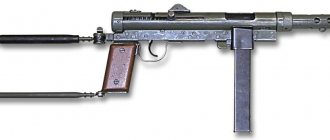The Chechen submachine gun "Borz" (in Chechen - "Wolf"), which was very popular in its time, is an excellent example of a small-sized, inexpensive and simple submachine gun that has proven itself well in close combat. However, the use of unsuitable steels and low quality production were the reasons for the abandonment of such weapons at one time.
Chechen Wolf
The high popularity of weapons is the result of the simplest design, low cost and availability. Small-scale production was established at the facilities of the Grozny Machine-Building Plant in accordance with the order of President Dudayev. The cartridges for the weapon were 9-mm Makarov pistol bullets. The weapon provided the ability to conduct both single and automatic fire.
There was a distribution in the structure of the troops of Chechnya, standard models of army weapons were transferred to the army, all other weapons were transferred to the militia forces of the republic. Often the militias armed themselves at their own expense, which was the reason for the popularity of the “WOLF”, which cannot boast of high shooting accuracy.
Weapon model from the game Fallout NV - Chechen SMG "Borz"
Exposition
The artifacts of the Central Museum of the Armed Forces can be divided into two parts: in the halls and in the open air. The halls contain over 15 thousand exhibits from various eras: weapons, military household items, photographs, personal belongings. The museum staff arranged the exhibits in the halls very competently. In the initial halls, exhibits from pre-revolutionary times will be examined. Then the story will go about the troops during the Civil War and the Great Patriotic War. After the halls with post-war events, a period of poverty, hunger and generally difficult life. The last rooms tell about the modern Russian army.
On the street there are large exhibits that took part in wars, but have either fallen into disrepair or are simply technically outdated. This is technology and weapons from different eras. Airplanes, helicopters, equipment of the navy and engineering troops. Famous Soviet artillery and heavy armored vehicles. The spectacle is truly fascinating; all the power of our country is concentrated in one square. Over 30 thousand personal belongings of soldiers, including famous personalities, are also presented here. 100 thousand photographs depicting the heroes of our country from ordinary soldiers to engineers, officers and generals. Many of the photos were taken not by photographers, but by ordinary people in an informal setting.
The Armed Forces Museum houses many very interesting artifacts. For example, an authentic part of the wall of the Brest Fortress, where a phrase is engraved confirming the incredible perseverance and courage of our soldiers: “I am dying, but I am not giving up. Farewell, Motherland! A plate from the Reichstag with the signatures of our soldiers engraved on it. The museum perfectly shows the military history of the fatherland. The halls fully reveal the essence of the time being shown, and together with a good guide you will be able to experience that time to the fullest.
Submachine gun K6-92 (also known as Eagle
[
source not specified 1773 days
]) was developed in Armenia in the early 1990s - shortly after the collapse of the USSR, in the context of an armed conflict with Azerbaijan over Nagorno-Karabakh [4].
Origin story
The period of the 1990s can be characterized as a time of general tension and armament among the republics that were part of the USSR. During our time as part of the union, we were able to some extent to smooth out conflicts and keep the situation under control. However, the collapse of the Soviet Union provided precisely the spark that ignited the process of war between states. It was difficult to surprise anyone with the presence of numerous small conflicts, and yesterday’s “brother nations” were ready to go out into the open and start a large-scale war. The only condition was that everyone needed weapons and in significant quantities.
By 1992, Armenian gunsmiths developed and sent for production the K6-92, which became the prototype for the production of the Chechen Borz submachine gun (PP). Moreover, this was the name given to both copies of the Armenian PP, produced in Chechnya, and other models of submachine guns created on its basis, handicraft and semi-handicraft produced there, and usually differing in design from the Armenian counterpart.
This submachine gun fully justified its purpose as an affordable weapon for forming partisan-type units. First of all, the Borz SMG is a concealed weapon that can be used for quick use and shooting at close range.
READ: Monuments that bring good luck
ChRI soldier with Borz, 1995
As a result, already in the mid-1990s, the word “Borz” essentially became not the name of a specific type of weapon produced by a specific enterprise, but a group designation for a whole type of handicraft or semi-handicraft manufactured PP of a simplified design, having North Caucasian origin. In criminal chronicles, almost any homemade SMG could appear as a “Borz”.
The lack of high-quality steel and the outbreak of war were the reasons for the cessation of production of these weapons, but in subsequent years craftsmen produced a huge number of handicraft versions of the submachine gun.
source
If you find an error, please select a piece of text and press Ctrl+Enter.
Similar articles:
- How many deaths during the war were from bullet wounds?
- M-16 vs Kalash: which weapon actually shoots better
- Which countries are armed with Soviet T-34 tanks today?
- Expert opinion: why an American assault rifle is better than a Kalashnikov assault rifle
- 10 most dangerous prison crafts: video
- Why cold and air guns cannot be carried for self-defense
machine guns weapons Chechnya
Countries Equipment
Intratec TEC DC-9
Since the early 90s, this assault pistol has been one of the top ten favorite guns for criminals of all stripes. Initially, the Swiss company Interdynamics AB intended the DC-9 for the military, but they did not like the weapon at all. But on the civilian market, the self-loading and rapid-fire pistol was in great demand, which was subsequently reflected in the criminal chronicles.
The Intratec TEC-DC9 (also known as TEC-9) is a semi-automatic pistol developed in Sweden in the 1980s.
An excerpt characterizing the Borz submachine gun
Who thinks about you too! That she too, with her beautiful hand, wandering along the golden harp, with her passionate harmony, calls to her, calls you! Another day or two, and heaven will come... But ah! your friend won't live! And he had not yet finished singing the last words when the young people in the hall were preparing to dance and the musicians in the choir began to knock their feet and cough. Pierre was sitting in the living room, where Shinshin, as if with a visitor from abroad, began a political conversation with him that was boring for Pierre, to which others joined. When the music started playing, Natasha entered the living room and, going straight to Pierre, laughing and blushing, said: “Mom told me to ask you to dance.” “I’m afraid of confusing the figures,” said Pierre, “but if you want to be my teacher...” And he extended his thick hand, lowering it low, to the thin girl. While the couples were settling down and the musicians were lining up, Pierre sat down with his little lady. Natasha was completely happy; she danced with a big one, with someone who came from abroad. She sat in front of everyone and talked to him like a big girl. She had a fan in her hand, which one young lady had given her to hold. And, assuming the most secular pose (God knows where and when she learned this), she, fanning herself and smiling through the fan, spoke to her gentleman. - What is it, what is it? Look, look,” said the old countess, passing through the hall and pointing at Natasha. Natasha blushed and laughed. - Well, what about you, mom? Well, what kind of hunt are you looking for? What's surprising here? In the middle of the third eco-session, the chairs in the living room, where the count and Marya Dmitrievna were playing, began to move, and most of the honored guests and old people, stretching after a long sitting and putting wallets and purses in their pockets, walked out the doors of the hall. Marya Dmitrievna walked ahead with the count - both with cheerful faces. The Count, with playful politeness, like a ballet, offered his rounded hand to Marya Dmitrievna. He straightened up, and his face lit up with a particularly brave, sly smile, and as soon as the last figure of the ecosaise was danced, he clapped his hands to the musicians and shouted to the choir, addressing the first violin: “Semyon!” Do you know Danila Kupor? This was the count's favorite dance, danced by him in his youth. (Danilo Kupor was actually one figure of the Anglese.) “Look at dad,” Natasha shouted to the whole hall (completely forgetting that she was dancing with a big one), bending her curly head to her knees and bursting into her ringing laughter throughout the hall. Indeed, everyone in the hall looked with a smile of joy at the cheerful old man, who, next to his dignified lady, Marya Dmitrievna, who was taller than him, rounded his arms, shaking them in time, straightened his shoulders, twisted his legs, slightly stamping his feet, and with a more and more blooming smile on his round face, he prepared the audience for what was to come. As soon as the cheerful, defiant sounds of Danila Kupor, similar to a cheerful chatterbox, were heard, all the doors of the hall were suddenly filled with men's faces on one side and women's smiling faces of servants on the other, who came out to look at the merry master. - Father is ours! Eagle! – the nanny said loudly from one door. The count danced well and knew it, but his lady did not know how and did not want to dance well. Her huge body stood upright with her powerful arms hanging down (she handed the reticule to the Countess); only her stern but beautiful face danced. What was expressed in the count's entire round figure, in Marya Dmitrievna was expressed only in an increasingly smiling face and a twitching nose. But if the count, becoming more and more dissatisfied, captivated the audience with the surprise of deft twists and light jumps of his soft legs, Marya Dmitrievna, with the slightest zeal in moving her shoulders or rounding her arms in turns and stamping, made no less an impression on merit, which everyone appreciated her obesity and ever-present severity. The dance became more and more animated. The counterparts could not attract attention to themselves for a minute and did not even try to do so. Everything was occupied by the count and Marya Dmitrievna. Natasha pulled the sleeves and dresses of all those present, who were already keeping their eyes on the dancers, and demanded that they look at daddy. During the intervals of the dance, the Count took a deep breath, waved and shouted to the musicians to play quickly. Quicker, quicker and quicker, faster and faster and faster, the count unfolded, now on tiptoes, now on heels, rushing around Marya Dmitrievna and, finally, turning his lady to her place, made the last step, raising his soft leg up from behind, bending his sweaty head with a smiling face and roundly waving his right hand amid the roar of applause and laughter, especially from Natasha. Both dancers stopped, panting heavily and wiping themselves with cambric handkerchiefs. “This is how they danced in our time, ma chere,” said the count. - Oh yes Danila Kupor! - Marya Dmitrievna said, letting out the spirit heavily and for a long time, rolling up her sleeves. While the Rostovs were dancing the sixth anglaise in the hall to the sounds of tired musicians out of tune, and tired waiters and cooks were preparing dinner, the sixth blow struck Count Bezukhy. The doctors declared that there was no hope of recovery; the patient was given silent confession and communion; They were making preparations for the unction, and in the house there was the bustle and anxiety of expectation, common at such moments. Outside the house, behind the gates, undertakers crowded, hiding from the approaching carriages, awaiting a rich order for the count's funeral. The Commander-in-Chief of Moscow, who constantly sent adjutants to inquire about the Count’s position, that evening himself came to say goodbye to the famous Catherine’s nobleman, Count Bezukhim. The magnificent reception room was full. Everyone stood up respectfully when the commander-in-chief, having been alone with the patient for about half an hour, came out of there, slightly returning the bows and trying as quickly as possible to pass by the gazes of doctors, clergy and relatives fixed on him. Prince Vasily, who had lost weight and turned pale during these days, saw off the commander-in-chief and quietly repeated something to him several times. Having seen off the commander-in-chief, Prince Vasily sat down alone on a chair in the hall, crossing his legs high, resting his elbow on his knee and closing his eyes with his hand. After sitting like this for some time, he stood up and with unusually hasty steps, looking around with frightened eyes, walked through the long corridor to the back half of the house, to the eldest princess. Those in the dimly lit room spoke in an uneven whisper to each other and fell silent each time and, with eyes full of question and expectation, looked back at the door that led to the dying man’s chambers and made a faint sound when someone came out of it or entered it. “The human limit,” said the old man, a clergyman, to the lady who sat down next to him and naively listened to him, “the limit has been set, but you cannot pass it.” “I’m wondering if it’s too late to perform unction?” - adding the spiritual title, the lady asked, as if she had no opinion of her own on this matter. “It’s a great sacrament, mother,” answered the clergyman, running his hand over his bald spot, along which ran several strands of combed, half-gray hair. -Who is this? was the commander in chief himself? - they asked at the other end of the room. - How youthful!... - And in his seventies! What, they say, the count won’t find out? Did you want to perform unction? “I knew one thing: I had taken unction seven times.” The second princess just left the patient’s room with tear-stained eyes and sat down next to Doctor Lorrain, who was sitting in a graceful pose under the portrait of Catherine, leaning his elbows on the table. “Tres beau,” said the doctor, answering a question about the weather, “tres beau, princesse, et puis, a Moscou on se croit a la campagne.” [beautiful weather, princess, and then Moscow looks so much like a village.] – N'est ce pas? [Isn’t it true?] - said the princess, sighing. - So can he drink? Lorren thought about it. – Did he take the medicine? - Yes. The doctor looked at the breget. “Take a glass of boiled water and put in une pincee (with his thin fingers he showed what une pincee means) de cremortartari... [a pinch of cremortartari...] “Don’t drink, listen,” the German doctor said to the adjutant, “so that after the third blow there was nothing left.” – What a fresh man he was! - said the adjutant. – And who will this wealth go to? – he added in a whisper. “There will be a okotnik,” the German answered, smiling. Everyone looked back at the door: it creaked, and the second princess, having made the drink shown by Lorren, took it to the sick man. The German doctor approached Lorren. - Maybe it will last until tomorrow morning? - asked the German, speaking bad French. Lorren, pursing his lips, sternly and negatively waved his finger in front of his nose. “Tonight, not later,” he said quietly, with a decent smile of self-satisfaction in the fact that he clearly knew how to understand and express the patient’s situation, and walked away. Meanwhile, Prince Vasily opened the door to the princess’s room. The room was dim; only two lamps were burning in front of the images, and there was a good smell of incense and flowers. The entire room was furnished with small furniture: wardrobes, cupboards, and tables. The white covers of a high down bed could be seen from behind the screens. The dog barked. - Oh, is it you, mon cousin? She stood up and straightened her hair, which had always, even now, been so unusually smooth, as if it had been made from one piece with her head and covered with varnish. - What, did something happen? – she asked. “I’m already so scared.” - Nothing, everything is the same; “I just came to talk to you, Katish, about business,” said the prince, wearily sitting down on the chair from which she had risen. “How did you warm it up, however,” he said, “well, sit here, causons.” [let's talk.] - I was wondering if something had happened? - said the princess and with her unchanged, stone-stern expression on her face, she sat down opposite the prince, preparing to listen. “I wanted to fall asleep, mon cousin, but I can’t.” - Well, what, my dear? - said Prince Vasily, taking the princess’s hand and bending it downwards according to his habit. It was clear that this “well, what” referred to many things that, without naming them, they both understood. The princess, with her incongruously long legs, lean and straight waist, looked directly and dispassionately at the prince with her bulging gray eyes. She shook her head and sighed as she looked at the images. Her gesture could be explained both as an expression of sadness and devotion, and as an expression of fatigue and hope for a quick rest. Prince Vasily explained this gesture as an expression of fatigue. “But for me,” he said, “do you think it’s easier?” Je suis ereinte, comme un cheval de poste; [I'm as tired as a post horse;] but still I need to talk to you, Katish, and very seriously. Prince Vasily fell silent, and his cheeks began to twitch nervously, first on one side, then on the other, giving his face an unpleasant expression that had never appeared on Prince Vasily’s face when he was in the living rooms. His eyes were also not the same as always: sometimes they looked brazenly joking, sometimes they looked around in fear.

